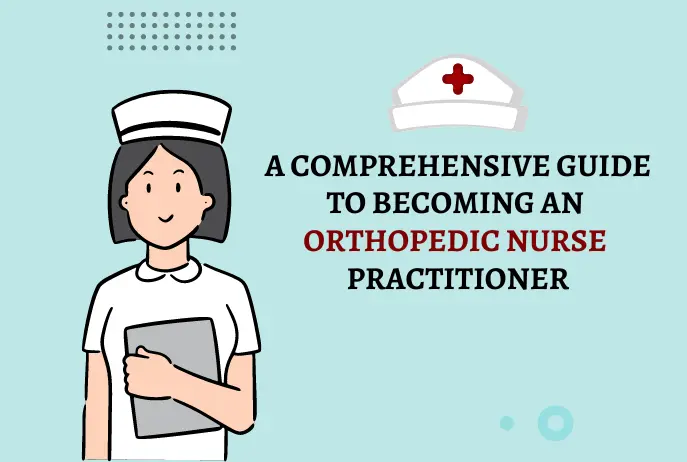Orthopedic nursing is a highly specialized nursing field that focuses on the treatment of orthopedic conditions. These conditions mainly include arthritis, fractures, back problems, and sports injuries.
An orthopedic nurse practitioner works with patients in orthopedic care settings such as surgery clinics, outpatient orthopedic clinics, and physical therapy facilities. They also work in orthopedic medical wards of inpatient hospitals.
Who is an Orthopedic Nurse Practitioner?
Now comes the real question: who is an orthopedic nurse practitioner and what responsibilities do they entail? They (NPs) are advanced practice registered nurses with extensive experience in assessing and treating injuries of the musculoskeletal system.
NPs are authorized to perform tasks traditionally reserved for physicians, such as prescribing medication, ordering tests, and performing minor surgeries. They also have a deep understanding of both the muscular and skeletal systems and how they work together.
Orthopedic Nurse Practitioner: Job Description
In nursing, orthopedic nurse practitioner jobs are in much demand. These nurses provide progressive medical care including treatment, diagnosis and prescribing medication for injuries and conditions that concern the musculoskeletal system. They work in various medical settings such as hospitals, clinics and emergency departments. The hours they work vary depending on the workplace setting, with some shifts requiring working nights, on-call shifts, or weekends.
As an orthopedic nurse practitioner, you will be practicing clinical nursing and have the responsibility of providing health care services to patients with orthopedic conditions. To develop individualized treatment plans for patients, you shall also be collaborating with other healthcare professionals. For this job title, a bachelor’s degree in nursing or equivalent experience is needed.
There are plenty of subspecialties for them that include: spine or hand surgery, sports medicine, pediatric orthopedics, podiatry, bone health, orthopedic oncology, joint replacement, trauma surgery, or osseointegration. Most nurse practitioners in orthopedics work in outpatient settings where they provide care to patients of all age groups.
Orthopedic Nurse Practitioner Schooling & Certification
In order to become an orthopedic nurse practitioner, a Master of Science in Nursing (MSN) degree is required at minimum. In addition, successful candidates are also required to have experience as a Registered Nurse (RN) or Advanced Practice Registered Nurse (APRN), a current RN or APRN license, and lastly, 1,000 hours of work experience as a registered nurse in orthopedic nursing practice within the past three years.
The ONCB certification is offered to aspiring ONPs who have successfully met these requirements and wish to showcase their advanced clinical skills and competency in orthopedics. Overall, it is vital for orthopedic nurse practitioners to complete a master’s program in nursing that covers all the necessary clinical practice hours.
It takes at least 10 years from the start of undergraduate education to the completion of an advanced practice nurse practitioner degree. Before enrolling in a nurse practitioner program, students must gain relevant bedside experience. Most advanced practice nurse practitioner programs require at least two years of experience in the field of nursing before students are accepted for the bachelor’s or advanced practice nursing program.
After the completion of the program, students who are interested will have to enroll in a one-year post-graduate certificate program that specializes in orthopedic care. These programs will help nurses continue their education and become more specialized and acquire more skills in orthopedic nursing care.
How to Become an Orthopedic Nurse Practitioner?
#1 Earn your Bachelor of Science in Nursing (BSN) Degree

To pursue a career as an Orthopedic Nurse Practitioner, students must first earn a Bachelor of Science in Nursing (BSN) degree. Usually, this requires four years of schooling, but accelerated degree programs exist for those who want to finish their BSN in as little as 32 months. BSN tuition costs vary, so be sure to do your research before applying for financial aid or enrolling in a program. Additionally, completing a BSN is vital for enrolling in a MSN program.
Completing your BSN is necessary to become a nurse practitioner because it provides the advanced skills and education necessary for treating orthopedic conditions. For example, you must be able to perform physical examinations on patients with orthopedic problems and understand the underlying causes of these problems. Besides, you must be able to accurately diagnose and treat musculoskeletal conditions such as arthritis and sports injuries.
#2 Earn your Master of Science in Nursing (MSN) Degree
For this professional role, a degree in MSN is the minimum requirement. To earn this degree, students are required to have a combination of in-classroom and clinical training, which can take up to two or three years to complete. For these programs, the average tuition cost ranges from $500 to $1,000 per credit hour. After completing your MSN program, you will have to pass a certification exam to practice as an orthopedic nurse practitioner in your local area.
#3 Pass the NCLEX-RN Certification Exam
The next step is to pass the NCLEX-RN exam. This is typically taken after earning a nursing degree. If the exam is not passed on the first try, one must wait 45 days before retaking it. To bypass this step, nurses with a Registered Nurse (RN) license before becoming an Orthopedic Nurse Practitioner can skip this step. Those who have already earned their nursing license can take this exam without additional education or certification.
#4 Gain Experience Working as a Nurse Practitioner
In addition to their clinical practice, nurse practitioners are also required to complete extra education and training. Often, they complete a bachelor’s degree in nursing or another nursing-related field before they continue their education in a master’s program or doctoral program.
Nurse practitioners also have to maintain certification in their specialty by completing continuing education requirements and passing exams that align with their specialty. Clinical certification is a must-have to practice as a nurse practitioner; certification from organizations such as the nurse practitioner certification board is also greatly helpful in establishing credibility among patients and employers.
#5 Get Certified as an Orthopedic Nurse Practitioner

To become a certified orthopedic nurse practitioner, you will need to have two years of experience as a licensed nurse or advanced practice registered nurse. In addition, you are required to have a current RN license and a minimum of 1,000 work hours of experience in orthopedic nursing practice in the previous three years.
After you’ve completed the certification requirements, the Orthopedic Nurses Certification Board (ONCB) will offer certification for aspiring on-pioneers in nursing.
Apart from certification, there are various continuing education opportunities for orthopedic nurses who want to stay updated on the latest research and treatment options in their field. This enables them to give patients the best possible care.
Orthopedic Nurse Practitioner Salary
Orthopedic nurse practitioners play a vital role in assessing and treating patients who suffer from musculoskeletal problems, from fractures and acute injuries to chronic pain and degenerative conditions. Recently, the demand for their skill and expertise in the workforce has been significantly high.
As of February 27, 2023, the average salary in the U.S. for an Orthopedic nurse practitioner (nurse practitioner in this field that focuses on orthopedics) is about $120,000. Throughout the rest of the world, the average salary for these nurses is nearly $100,000 per year or $43.90 per hour. Benefits packages for orthopedic nurses may include annual bonuses, paid time off, health insurance, tuition reimbursement and many more.
Although the salary varies according to certification and experience, it is a high-paying job with several benefits, such as medical and dental insurance, advanced education grants and employee-purchased health care plans.
As with any nursing specialty, an orthopedic nurse’s base salary is mainly determined by years of experience in the profession, but certification and colleges can also have a significant impact on salary.
Conclusion
We hope that, from the above detailed discussion, now you know how to become an orthopedic nurse practitioner. Orthopedic nursing, without a doubt, is on the rise. With plenty of nursing specialties to choose from in orthopedics and an increased focus on patient-centered care, it has become very evident that orthopedic nursing is here to stay.
If you think you have what it takes to become an orthopedic nurse practitioner, we are strongly encouraging you to continue reading and studying for certification and licensure exams. It is definitely a long process, but one that can help you advance your nursing career.
FAQs
What kinds of knowledge should an orthopedic nurse have?
Working in this field means that an orthopedic nurse should have an in-depth knowledge of anatomy, physiology, and kinesiology, as well as knowledge of common musculoskeletal disorders and their treatment.
What is the hardest part of being a nurse practitioner?
Some common struggles that nurse practitioners report may include managing high patient volumes, working long hours and handling emotionally difficult situations. Additionally, depending on their location and employment, NPs may also face challenges with regulatory restrictions or limitations on their scope of practice.
What are the rules and responsibilities of an orthopedic nurse?
The rules and responsibilities that orthopedic nurses are obliged to follow include:
1. Assessing and monitoring a patient’s physical conditions, symptoms and vital signs.
2. Administering and monitoring treatments and medications, such as wound care and pain management.
3. Collaborating with other members of the healthcare team, such as occupational therapists, physical therapists, and physicians.
4. Educating patients and their families on optimal post-operative care as well as rehabilitation
5. Assisting with surgical procedures, such as preparing and positioning patients for surgery
6. Maintenance of patient records and documentation of care provided
7. Supervising and mentoring the work of other nurses and healthcare professionals.
What is the work schedule for an orthopedic nurse?
The work schedule for orthopedic nurses varies depending on the employer and the specific job duties this profession entails. Some orthopedic nurses may be required to work a standard 8-hour shift, with occasional weekend or evening hours as needed. Others may work in home healthcare or rehabilitation settings, where the working hours are more flexible in order to accommodate patient needs.

Leave a Reply